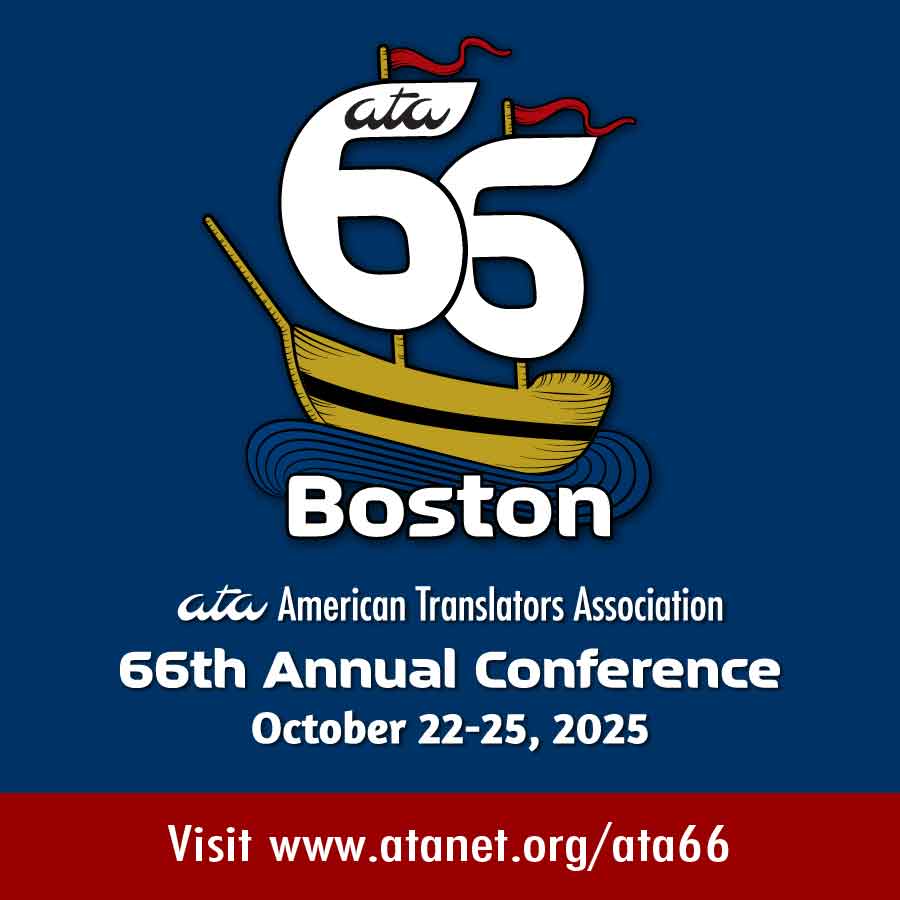
Hello JLD members and blog readers! It’s that time of year again when the ATA puts out a call for speakers to present at the annual conference, which this year is ATA66 in Boston, Massachusetts in October. The JLD Planning Committee is hard at work behind the scenes looking for volunteers and helping candidates polish their ideas and proposals. If you are considering submitting a proposal, please contact the Admins by sending an email to DivisionJLD@atanet.org. The Planning Committee will help you develop a winning proposal.
I remember poring over my first ATA conference submission about pre-editing documents for MT in 2023. Despite being a notoriously fast speaker (especially when nervous), I was passionate about sharing my experience and insights from post-ending documents that had been machine translated… and learning that a good pre-edit can make the post-editing job a lot easier. After putting together the best proposal I could, I was half relieved and half disappointed when I received notification that my session had been wait-listed. The relief was mostly because I’m a terribly nervous public speaker. The disappointment was purely driven by my desire to knock things out of the park on the first try—like being selected to present at a conference I had never attended before. That disappointment was short lived, however, because I was called up to present in mid-summer. In October 2023, despite my nerves, I had the chance to share my insights and tips on pre-editing Japanese documents with a group of about 15 attendees. By the time my hour was up, I was delighted to realize my audience was engaged with my material and fielded several questions. Hopefully, I can repeat the process for ATA66.
Being a presenter at ATA is an incredible experience. Of course there is the pride of submitting a winning proposal and the pressure of delivering a quality session. But the entire conference itself is an incredible opportunity to meet with and learn from other linguists across multiple languages and professions. For example, the extent of my German begins and ends with something that sounds like “iss dyne schnitzel sons kreegs du kyna nak tish” and (ostensibly) means “eat your schnitzel or you don’t get any dessert” but I still attended a session in English with German examples. The topic was about the tech industry, and I wanted to learn more about tech concepts because of tech-related activity at my Japanese automotive job. Plus, attending the conference brought me into contact with so many wonderful JLD colleagues and kickstarted my newest hobby: volunteering for the JLD.
If you’re interested in getting more connected with the translation industry and making more personal connections with fellow language professionals, you may want to consider submitting a proposal for ATA66!
Whether it’s your first time or your 66th time, proposal requirements have changed this year. Let’s look at what proposal elements are the same and what’s new for 2025 (see last four bottom-right line items). Note that “Past Requirements” details came from an explanatory video ATA had previously published on its website about how to make a proposal. “New Requirements” details come partly from information on its website (the call for speakers page) and partly from the proposal submission portal.
| Past Requirements | Current Requirements (as of Jan. 2025) |
|---|---|
| Speaker Information Name Address Contact details | Speaker Information Name Address Contact details |
| Co-speakers | Co-speakers |
| Session Title 20 words max | Session Title 20 words max |
| Session Details Session type (60 min, DS, AST, other) 100 words max What are the goals/learning outcomes of the session? How will attendees benefit? (DS=Distinguished Speaker, AST=Advanced Skills & Training) | Session Details Session type (60 min, DS, AST) Session Description (100 words or less) Track (Translation or interpretation) Language Subject matter/topic Length (1 × 60 min session, 2 × 60 min DS sessions, 1 × 180 min AST session) Objectives Audience (Who is this session for?) Have you given this presentation before? |
| Speaker Bio 100 words max, explain how speaker qualifications/speaker experience is relevant for the proposal | Speaker Bio (Specific details available upon registration) |
| — | Proposals must be original Sessions cannot have been presented previously and cannot be presented elsewhere within three months |
| — | Proposals must cite sources |
| — | Proposals must identify 3 relevant learning points |
| — | Complete presentation materials must be submitted by September 1, 2025 |
Overall, the process and requirements for submissions are largely the same. The new requirements to contain completely new material, cite sources, and explicitly state learning outcomes are solid additions. For presenters, these requirements may help focus content on the major takeaways. And for attendees, these requirements ensure sessions will provide meaningful content. More information is also available at the official website here). Details about the submission requirements are available here.
Thank you for reading and good luck if you are submitting a proposal!
Authored by: Audra lincoln
Edited by: Syra Morii

Leave a Reply